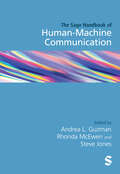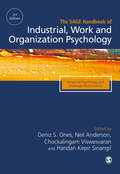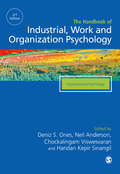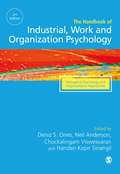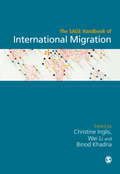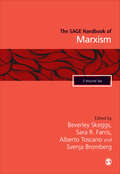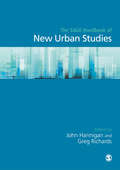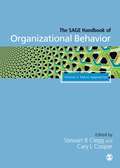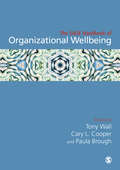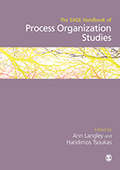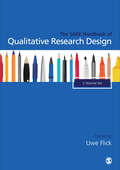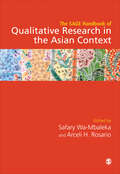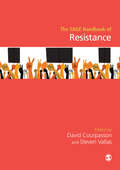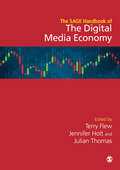- Table View
- List View
The SAGE Handbook of Human–Machine Communication
by Steve Jones Rhonda McEwen Andrea L. GuzmanThe SAGE Handbook of Human-Machine Communication has been designed to serve as the touchstone text for researchers and scholars engaging in new research in this fast-developing field. Chapters provide a comprehensive grounding of the history, methods, debates and theories that contribute to the study of human-machine communication. Further to this, the Handbook provides a point of departure for theorizing interactions between people and technologies that are functioning in the role of communicators, and for considering the theoretical and methodological implications of machines performing traditionally ‘human’ roles. This makes the Handbook the first of its kind, and a valuable resource for students and scholars across areas such as communication, media and information studies, and computer science, as well as for practitioners, engineers and researchers interested in the foundational elements of this emerging field. Part 1: Histories and Trajectories Part 2: Approaches and Methods Part 3: Concepts and Contexts Part 4: Technologies and Applications
The SAGE Handbook of Industrial, Work & Organizational Psychology: V1: Personnel Psychology and Employee Performance
by Neil Anderson Deniz S Ones Dr Chockalingam Viswesvaran Handan Kepir SinangilThe first volume in The SAGE Handbook of Industrial, Organizational and Work Psychology introduces key concepts in personnel and employee performance from cognitive ability and the psychological predictors used in assessments to employee and team values. The editor and contributors present a clear overview of key research in the areas of behaviour change and how to assess individual job performance – making Volume I indispensable for anyone working in or studying Human Resource Management.
The SAGE Handbook of Industrial, Work & Organizational Psychology: V1: Personnel Psychology and Employee Performance
by Neil Anderson Deniz S Ones Dr Chockalingam Viswesvaran Handan Kepir SinangilThe first volume in The SAGE Handbook of Industrial, Organizational and Work Psychology introduces key concepts in personnel and employee performance from cognitive ability and the psychological predictors used in assessments to employee and team values. The editor and contributors present a clear overview of key research in the areas of behaviour change and how to assess individual job performance – making Volume I indispensable for anyone working in or studying Human Resource Management.
The SAGE Handbook of Industrial, Work & Organizational Psychology: V2: Organizational Psychology
by Neil Anderson Deniz S Ones Dr Chockalingam Viswesvaran Handan Kepir SinangilThe second volume in the SAGE Handbook of Industrial, Organizational and Work Psychology looks in detail at how teams and individuals function and perform. It covers motivation and organizational socialisation as well as the latest research into diversity and organizational culture in the workplace. There are also sections on social networks and how job loss and the experience of unemployment can affect individuals and wider groups within organizations. Part One: Lenses Part Two: Social and Political Order Part Three: Legacies Part Four: Problems and Problematics
The SAGE Handbook of Industrial, Work & Organizational Psychology: V2: Organizational Psychology
by Neil Anderson Deniz S Ones Dr Chockalingam Viswesvaran Handan Kepir SinangilThe second volume in the SAGE Handbook of Industrial, Organizational and Work Psychology looks in detail at how teams and individuals function and perform. It covers motivation and organizational socialisation as well as the latest research into diversity and organizational culture in the workplace. There are also sections on social networks and how job loss and the experience of unemployment can affect individuals and wider groups within organizations. Part One: Lenses Part Two: Social and Political Order Part Three: Legacies Part Four: Problems and Problematics
The SAGE Handbook of Industrial, Work & Organizational Psychology: V3: Managerial Psychology and Organizational Approaches
by Neil Anderson Deniz S Ones Dr Chockalingam Viswesvaran Handan Kepir SinangilThe third volume in The SAGE Handbook of Industrial, Organizational and Work Psychology concentrates on business decision-making and the many factors influencing the adoption and implementation of IWO practices. Chapter topics include utility assessments of interventions, decision-making errors in IWO systems, large-scale interventions and best practices reviews. Volume Three offers a comprehensive overview of the field for anyone working in or studying managerial or organizational psychology.
The SAGE Handbook of Industrial, Work & Organizational Psychology: V3: Managerial Psychology and Organizational Approaches
by Neil Anderson Deniz S Ones Dr Chockalingam Viswesvaran Handan Kepir SinangilThe third volume in The SAGE Handbook of Industrial, Organizational and Work Psychology concentrates on business decision-making and the many factors influencing the adoption and implementation of IWO practices. Chapter topics include utility assessments of interventions, decision-making errors in IWO systems, large-scale interventions and best practices reviews. Volume Three offers a comprehensive overview of the field for anyone working in or studying managerial or organizational psychology.
The SAGE Handbook of International Migration
by Wei Li Binod Khadria Christine InglisThe SAGE Handbook of International Migration provides an authoritative and informed analysis of key issues in international migration, including its crucial significance far beyond the more traditional questions of immigrant settlement and incorporation in particular countries. Bringing together chapters contributed by an international cast of leading voices in the field, the Handbook is arranged around four key thematic parts: Part 1: Disciplinary Perspectives on Migration Part 2: Historical and Contemporary Flows of Migrants Part 3: Theory, Policy and the Factors Affecting Incorporation Part 4: National and Global Policy Challenges in Migration The last three decades have seen the rapid increase and diversification in the types of international migration, and this Handbook has been created to meet the need among academics and researchers across the social sciences, policy makers and commentators for a definitive publication which provides a range of perspectives and insights into key themes and debates in the field.
The SAGE Handbook of International Migration
by Wei Li Binod Khadria Christine InglisThe SAGE Handbook of International Migration provides an authoritative and informed analysis of key issues in international migration, including its crucial significance far beyond the more traditional questions of immigrant settlement and incorporation in particular countries. Bringing together chapters contributed by an international cast of leading voices in the field, the Handbook is arranged around four key thematic parts: Part 1: Disciplinary Perspectives on Migration Part 2: Historical and Contemporary Flows of Migrants Part 3: Theory, Policy and the Factors Affecting Incorporation Part 4: National and Global Policy Challenges in Migration The last three decades have seen the rapid increase and diversification in the types of international migration, and this Handbook has been created to meet the need among academics and researchers across the social sciences, policy makers and commentators for a definitive publication which provides a range of perspectives and insights into key themes and debates in the field.
The SAGE Handbook of Marxism
by Beverley Skeggs Sara R. Farris Alberto Toscano Svenja BrombergThe past decade has witnessed a resurgence of interest in Marxism both within and without the academy. Marxian frameworks, concepts and categories continue to be narratively relevant to the features and events of contemporary capitalism. Most crucially, an attention to shifting cultural conditions has lead contemporary researchers to re-confront some classical and essential Marxist concepts, as well as elaborating new critical frameworks for the analysis of capitalism today. The SAGE Handbook of Marxism showcases this cutting-edge of today’s Marxism. It advances the debate with essays that rigorously map and renew the concepts that have provided the groundwork and main currents for Marxist theory, and showcases interventions that set the agenda for Marxist research in the 21st century. A rigorous and challenging collection of scholarship, this book contains a stunning range of contributions from contemporary academics, writers and theorists from around the world and across disciplines, invaluable to scholars and graduate students alike. Part 1: Reworking the critique of political economy Part 2: Forms of domination, subjects of struggle Part 3: Political perspectives Part 4: Philosophical dimensions Part 5: Land and existence Part 6: Domains Part 7: Inquiries and debates
The SAGE Handbook of Marxism
by Beverley Skeggs Sara R. Farris Alberto Toscano Svenja BrombergThe past decade has witnessed a resurgence of interest in Marxism both within and without the academy. Marxian frameworks, concepts and categories continue to be narratively relevant to the features and events of contemporary capitalism. Most crucially, an attention to shifting cultural conditions has lead contemporary researchers to re-confront some classical and essential Marxist concepts, as well as elaborating new critical frameworks for the analysis of capitalism today. The SAGE Handbook of Marxism showcases this cutting-edge of today’s Marxism. It advances the debate with essays that rigorously map and renew the concepts that have provided the groundwork and main currents for Marxist theory, and showcases interventions that set the agenda for Marxist research in the 21st century. A rigorous and challenging collection of scholarship, this book contains a stunning range of contributions from contemporary academics, writers and theorists from around the world and across disciplines, invaluable to scholars and graduate students alike. Part 1: Reworking the critique of political economy Part 2: Forms of domination, subjects of struggle Part 3: Political perspectives Part 4: Philosophical dimensions Part 5: Land and existence Part 6: Domains Part 7: Inquiries and debates
The SAGE Handbook of New Urban Studies
by Greg Richards Dr John A. HanniganThe last two decades have been an exciting and richly productive period for debate and academic research on the city. The SAGE Handbook of New Urban Studies offers comprehensive coverage of this modern re-thinking of urban theory, both gathering together the best of what has been achieved so far, and signalling the way to future theoretical insights and empirically grounded research. Featuring many of the top international names in the field, the handbook is divided into nine key sections: SECTION 1: THE GLOBALIZED CITY SECTION 2: URBAN ENTREPRENEURIALISM, BRANDING, GOVERNANCE SECTION 3: MARGINALITY, RISK AND RESILIENCE SECTION 4: SUBURBS AND SUBURBANIZATION: STRATIFICATION, SPRAWL, SUSTAINABILITY SECTION 5: DISTINCTIVE AND VISIBLE CITIES SECTION 6: CREATIVE CITIES SECTION 7: URBANIZATION, URBANITY AND URBAN LIFESTYLES SECTION 8: NEW DIRECTIONS IN URBAN THEORY SECTION 9: URBAN FUTURES This is a central resource for researchers and students of Sociology, Cultural Geography and Urban Studies.
The SAGE Handbook of New Urban Studies
by Greg Richards Dr John A. HanniganThe last two decades have been an exciting and richly productive period for debate and academic research on the city. The SAGE Handbook of New Urban Studies offers comprehensive coverage of this modern re-thinking of urban theory, both gathering together the best of what has been achieved so far, and signalling the way to future theoretical insights and empirically grounded research. Featuring many of the top international names in the field, the handbook is divided into nine key sections: SECTION 1: THE GLOBALIZED CITY SECTION 2: URBAN ENTREPRENEURIALISM, BRANDING, GOVERNANCE SECTION 3: MARGINALITY, RISK AND RESILIENCE SECTION 4: SUBURBS AND SUBURBANIZATION: STRATIFICATION, SPRAWL, SUSTAINABILITY SECTION 5: DISTINCTIVE AND VISIBLE CITIES SECTION 6: CREATIVE CITIES SECTION 7: URBANIZATION, URBANITY AND URBAN LIFESTYLES SECTION 8: NEW DIRECTIONS IN URBAN THEORY SECTION 9: URBAN FUTURES This is a central resource for researchers and students of Sociology, Cultural Geography and Urban Studies.
The SAGE Handbook of Organizational Behavior: Volume Two: Macro Approaches
by Stewart R Clegg Professor Cary L Cooper`The Sage Handbook of Organizational Behaviour is a fine addition to past works of reference in the field, edited by two prominent scholars who are internationally known. Its approach is both critical and original in many incisive ways, aspiring to a cutting-edge coverage of the core and periphery of OB. Many of the chapter authors stick their necks out and avoid the more obvious, conventional expositions of their topic. It covers a wide range of topics of potential use to both undergraduate and postgraduate students of the subject, as well as academics, researchers and practitioners. It will be of particular interest to those on MBA and DBA courses. It can be strongly recommended as an essential faculty library purchase, as well as a useful tool for individuals interested in having such a guide to the subject at hand' - Professor Malcolm Warner, Emeritus Fellow, Wolfson College and Judge Business School, University of Cambridge `This important new Handbook brings together for the first time a collection of major contributions on macro-organizational behaviour. This area of study is concerned with the ways in which the people who inhabit organizations make sense of their situations, contributing to the distinctive character of those organizations through their actions and struggles. The conventional literature, artificially divided between micro organizational behaviour and organization theory, has under-explored this obvious conjunction between people and organizations. Stewart Clegg and Cary Cooper perform a great service in helping to make good the deficiency' - John Child, Professor of Commerce, Birmingham Business School `Thorough and comprehensive. Thoughtful critique and new insights' - Chris Argyris, James B. Conant Professor, Emeritus, Harvard University In this second volume of The SAGE Handbook of Organizational Behavior, the focus is on macro-organizational behavior, revealing ways in which the person and group affect the organization. Chapters are written by eminent and upcoming scholars in the field, each presenting on the major issues in organizational behavior as seen with a macro-lens. The Handbook is divided into three parts, the first introducing and framing the field; the second part considering the various organizational processes involved, including learning, teamwork, identity and power, among others, while finally Part Three introduces organizing on a macro-scale, covering topics such as organizational change, design governance and globalization. The SAGE Handbook of Organizational Behavior: Macro Approaches is an essential resource for researchers and students across management and organization studies.
The SAGE Handbook of Organizational Wellbeing
by Cary L. Cooper Tony Wall Paula BroughThe SAGE Handbook of Organizational Wellbeing is a comprehensive and cutting-edge work providing the latest insights into a range of perspectives on organizational wellbeing, as well as highlighting global wellbeing issues and exploring new contexts. Topics covered include: digital working and social media, LGBTQIA+ identifications and work, suicide at work, refugee workers, and mental health. A multi- and inter-disciplinary work, this handbook embraces ideas and empirical work from a range of fields including psychology, business and management, economics, and science. This handbook draws together current knowledge whilst also outlining emerging issues and directions, making this an invaluable resource for students and researchers spanning a wide array of disciplines. Part 1: Theoretical Perspectives Part 2: International Issues and Contexts Part 3: Developing Organizational Wellbeing Part 4: Emerging Issues and Directions
The SAGE Handbook of Organizational Wellbeing
by Cary L. Cooper Tony Wall Paula BroughThe SAGE Handbook of Organizational Wellbeing is a comprehensive and cutting-edge work providing the latest insights into a range of perspectives on organizational wellbeing, as well as highlighting global wellbeing issues and exploring new contexts. Topics covered include: digital working and social media, LGBTQIA+ identifications and work, suicide at work, refugee workers, and mental health. A multi- and inter-disciplinary work, this handbook embraces ideas and empirical work from a range of fields including psychology, business and management, economics, and science. This handbook draws together current knowledge whilst also outlining emerging issues and directions, making this an invaluable resource for students and researchers spanning a wide array of disciplines. Part 1: Theoretical Perspectives Part 2: International Issues and Contexts Part 3: Developing Organizational Wellbeing Part 4: Emerging Issues and Directions
The SAGE Handbook of Process Organization Studies
by Ann Langley Haridimos TsoukasThe SAGE Handbook of Process Organization Studies provides a comprehensive and timely overview of the field. This volume offers a compendium of perspectives on process thinking, process organizational theory, process research methodology and empirical applications. The emphasis is on a combination of pedagogical contributions and in-depth reviews of current thinking and research in each of the selected areas, combined with the development of agendas for future research. The Handbook is divided into five sections: Part One: Process Philosophy Part Two: Process Theory Part Three: Process Methodology Part Four: Process Applications Part Five: Process Perspectives
The SAGE Handbook of Process Organization Studies
by Ann Langley Haridimos TsoukasThe SAGE Handbook of Process Organization Studies provides a comprehensive and timely overview of the field. This volume offers a compendium of perspectives on process thinking, process organizational theory, process research methodology and empirical applications. The emphasis is on a combination of pedagogical contributions and in-depth reviews of current thinking and research in each of the selected areas, combined with the development of agendas for future research. The Handbook is divided into five sections: Part One: Process Philosophy Part Two: Process Theory Part Three: Process Methodology Part Four: Process Applications Part Five: Process Perspectives
The SAGE Handbook of Qualitative Research Design
by Uwe FlickQualitative research design is continually evolving. It is not only more established in disciplines beyond the traditional social sciences in which it is a standard choice, but also just as impacted by the changes in what data, technologies, and approaches researchers are using. This Handbook takes readers through the foundational theories, functions, strategies, and approaches to qualitative research design, before showcasing how it negotiates different data and research environments and produces credible, actionable impact beyond the study. Containing contributions from over 90 top scholars from a range of social science disciplines, this Handbook is not just an anthology of different qualitative research designs and how/when to use them; it is a complete exploration of how and why these designs are shaped and how, why, and into what they are evolving. This is a valuable resource for Master’s and PhD level students, faculty members, and researchers across a wide range of disciplines such as health, nursing, psychology, social work, sociology, and education. Volume One: Part I: Concepts of Designing Designs in Qualitative Research Part 2: Theories and Epistemological Contexts of Designing Qualitative Research Part 3: Elements of Designing Qualitative Research Part 4: Basic Designs and Research Strategies in Qualitative Research Part 5: Mixing Methods in Designing Qualitative Research Volume Two: Part 6: Designing Qualitative Research for Specific Kinds of Data Part 7: Designing Qualitative Online and Multimodal Research Part 8: Designing Qualitative Research for Specific Groups and Areas Part 9: Designing Qualitative Research in Disciplinary Fields Part 10: Designing Qualitative Research for Impact
The SAGE Handbook of Qualitative Research Design
by Uwe FlickQualitative research design is continually evolving. It is not only more established in disciplines beyond the traditional social sciences in which it is a standard choice, but also just as impacted by the changes in what data, technologies, and approaches researchers are using. This Handbook takes readers through the foundational theories, functions, strategies, and approaches to qualitative research design, before showcasing how it negotiates different data and research environments and produces credible, actionable impact beyond the study. Containing contributions from over 90 top scholars from a range of social science disciplines, this Handbook is not just an anthology of different qualitative research designs and how/when to use them; it is a complete exploration of how and why these designs are shaped and how, why, and into what they are evolving. This is a valuable resource for Master’s and PhD level students, faculty members, and researchers across a wide range of disciplines such as health, nursing, psychology, social work, sociology, and education. Volume One: Part I: Concepts of Designing Designs in Qualitative Research Part 2: Theories and Epistemological Contexts of Designing Qualitative Research Part 3: Elements of Designing Qualitative Research Part 4: Basic Designs and Research Strategies in Qualitative Research Part 5: Mixing Methods in Designing Qualitative Research Volume Two: Part 6: Designing Qualitative Research for Specific Kinds of Data Part 7: Designing Qualitative Online and Multimodal Research Part 8: Designing Qualitative Research for Specific Groups and Areas Part 9: Designing Qualitative Research in Disciplinary Fields Part 10: Designing Qualitative Research for Impact
The SAGE Handbook of Qualitative Research in the Asian Context
by Safary Wa-Mbaleka Arceli H. RosarioQualitative research is growing in Asia and globally. In an Asian context, this requires an awareness of a completely different set of norms, practices, and expectations than those covered by books from a western perspective. This handbook truly celebrates these differences. Spanning the full research process, from philosophy and ethics to design and methods and through data collection, management, analysis, and dissemination, it focuses specifically on the practicalities needed to conduct effective and culturally responsive research in the Asian context. This handbook extends beyond researchers actually in Asia and also speaks to researchers working with Asian participants, researching in Asian immigrant neighbourhoods, and studying the larger global topics like socioeconomic challenges, climate change, or technological advancement. This is the first book to focus specifically on qualitative research in the Asian context and includes diverse contributors from Asia such as the Philippines, Singapore, Thailand, India, Oman, China, South Korea, Indonesia, Kazakhstan, Hong Kong, and from other continents such as North America, South America, Africa, Europe, and Oceania. Section 1: Foundations of Qualitative Research in Asia Section 2: Qualitative Research Designs Section 3: Best Practices in Dealing with Qualitative Research Data Section 4: Other Qualitative Research Topics
The SAGE Handbook of Qualitative Research in the Asian Context
by Safary Wa-Mbaleka Arceli H. RosarioQualitative research is growing in Asia and globally. In an Asian context, this requires an awareness of a completely different set of norms, practices, and expectations than those covered by books from a western perspective. This handbook truly celebrates these differences. Spanning the full research process, from philosophy and ethics to design and methods and through data collection, management, analysis, and dissemination, it focuses specifically on the practicalities needed to conduct effective and culturally responsive research in the Asian context. This handbook extends beyond researchers actually in Asia and also speaks to researchers working with Asian participants, researching in Asian immigrant neighbourhoods, and studying the larger global topics like socioeconomic challenges, climate change, or technological advancement. This is the first book to focus specifically on qualitative research in the Asian context and includes diverse contributors from Asia such as the Philippines, Singapore, Thailand, India, Oman, China, South Korea, Indonesia, Kazakhstan, Hong Kong, and from other continents such as North America, South America, Africa, Europe, and Oceania. Section 1: Foundations of Qualitative Research in Asia Section 2: Qualitative Research Designs Section 3: Best Practices in Dealing with Qualitative Research Data Section 4: Other Qualitative Research Topics
The SAGE Handbook of Resistance
by David Courpasson Steven VallasOccupy. Indignados. The Tea Party. The Arab Spring. Anonymous. These and other terms have become part of an emerging lexicon in recent years, signalling an important development that has gripped many parts of the world: millions of people are increasingly involved, whether directly or indirectly, in movements of resistance and protestation. However, resistance and its conceptual "companions", protest, contestation, opposition, disobedience and mobilization, all seem to be still mostly seen in public and private discourses as illegitimate and problematic forms of action. The time is, therefore, ripe to delve into the concerns, themes and legitimacy. The SAGE Handbook of Resistance offers theoretical essays enabling readers to forge their own perspectives of what "is" resistance and emphasizes the empirical and experiential dimension of resistance - making strong choices in terms of how contemporary topics related to resistance help to rethink our societies as "protest societies". The coverage is divided into six key sub-sections: Foundations Sites of Resistance Technologies of Resistance Languages of Resistance Geographies of Resistance Consequences of Resistance
The SAGE Handbook of Resistance
by David Courpasson Steven VallasChosen by Library Journal as one of the best reference texts of 2016. Occupy. Indignados. The Tea Party. The Arab Spring. Anonymous. These and other terms have become part of an emerging lexicon in recent years, signalling an important development that has gripped many parts of the world: millions of people are increasingly involved, whether directly or indirectly, in movements of resistance and protestation. However, resistance and its conceptual "companions”, protest, contestation, opposition, disobedience and mobilization, all seem to be still mostly seen in public and private discourses as illegitimate and problematic forms of action. The time is, therefore, ripe to delve into the concerns, themes and legitimacy. The SAGE Handbook of Resistance offers theoretical essays enabling readers to forge their own perspectives of what “is” resistance and emphasizes the empirical and experiential dimension of resistance - making strong choices in terms of how contemporary topics related to resistance help to rethink our societies as “protest societies”. The coverage is divided into six key sub-sections: Foundations Sites of Resistance Technologies of Resistance Languages of Resistance Geographies of Resistance Consequences of Resistance
The SAGE Handbook of the Digital Media Economy
by Julian Thomas Terry Flew Jennifer HoltDebates about the digital media economy are at the heart of media and communication studies. An increasingly digitalised and datafied media environment has implications for every aspect of the field, from ownership and production, to distribution and consumption. The SAGE Handbook of the Digital Media Economy offers students, researchers and policy-makers a multidisciplinary overview of contemporary scholarship relating to the intersection of the digital economy and the media, cultural, and creative industries. It provides an overview of the major areas of debate, and conceptual and methodological frameworks, through chapters written by leading scholars from a range of disciplinary perspective. PART 1: Key Concepts PART 2: Methodological Approaches PART 3: Media Industries of the Digital Economy PART 4: Geographies of the Digital Economy PART 5: Law, Governance and Policy
